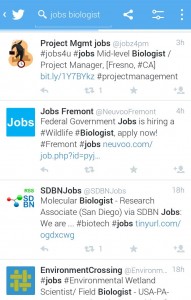Social media has become a huge part, in one way or another, of our lives. I’d hazard a guess that it is here to stay. Incredibly, beneath the layer of selfies and meal snapshots, social media has developed into a network that allows you to share news about current events, conduct polls, and communicate with your connections at ease. It has also opened up a channel through which people can find career opportunities. And yes, even we, the isolated academics, can take advantage of social media to find some new doors and maybe even crack one open. We hear about LinkedIn enough, and I personally wouldn’t advise using Facebook to network with potential employers. But what about Twitter? Turns out, Twitter can be pretty useful too!
Companies and organizations have slowly discovered that monitoring what the Twitterverse has to say about them is a major component of finding feedback on their apps, products, etc. Celebrities use Twitter to update us on anything from their latest charity to their most recent bathroom mirror selfie. But what about job seekers? Well it turns out people have actually gotten jobs through Twitter! And while I am not suggesting you make Twitter your sole job search engine, here are some ways to use it to your advantage while on the mission for employment.
- Post and follow content related to your field of work
Tweet a link to a new interesting article in your field, with a sentence that sums up why it is exciting. Express a (factually accurate!) opinion on a current scientific debate. This sort of activity will help associate your Twitter profile with your professional identity. Anyone stumbling upon your profile will know what your interests are, and you never know who might make the leap and go check out your LinkedIn.
Start by searching for keywords related to your preferred positions. A simple search, like “biologist jobs” yields a treasure of Twitter accounts, including NatureJobs, NIH, some pharma and industry accounts, and a generic Get Biology Jobs feed. (Also mining jobs in Edmonton, Canada, but we’ll just ignore that one.) Tweets about open positions can often go up before the full job ad – one is 140 characters while the other is… well, a bit longer.
- Do your homework about a certain employer
Once you snag an interview with a potential employer, make sure you have extensive background knowledge about the company, including any recent news. If that employer has a Twitter feed, you probably want to start following it to keep up to date. And once you are employed, it might be even more important to stay abreast of what consumers are saying about your new workplace (Is the company going broke? Facing lawsuits? Getting amazing reviews for a new product?).
- Reply!
When someone addresses you or replies to your Tweet, reply back! If nothing else, it helps you get more followers. You may also make a new professional contact. You may be introduced to a new user who has something interesting to say.
- Time your Tweets strategically
If you want something to be seen by your professional peers, find out what their peak activity hours are and time your posts accordingly. Also, in the course of my research on this blog post, I have read over and over again that there is no shame in Tweeting something more than once. If it’s a really good Tweet, go ahead and post it again in a week or so, maybe at a different peak time – you’ll likely reach a different audience.
You may be wondering if this piece is just a great example of “Do as I say, not as I do”. After all, who has time to monitor Twitter on top of research, networking, editing your CV, etc.? I will admit, I will not be looking for my postdoc using Twitter (I searched for specific institutions and their postdoc opportunities, but as expected, these don’t seem to get Tweeted too often). I have, however, started keeping science-related lists on Twitter, and I periodically check out what job posting accounts show up if I search certain key words. Ideally, if you make a list with the most relevant job announcement accounts now, you’ll have a wealth of postings to search for when you do start looking for your next employer. Best of luck to everyone leaving the academic nest!
